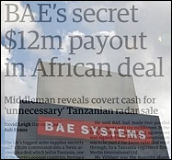Mar
7
DDTC Poised to Impose Export Ban on BAE
 Posted by Clif Burns at 6:46 pm on March 7, 2011
Posted by Clif Burns at 6:46 pm on March 7, 2011
 Category: Arms Export • DDTC
Category: Arms Export • DDTC
 Almost one year ago, on March 4, 2010, this blog reported that the Directorate of Defense Trade Controls (“DDTC”) had posted a website notice that all BAE export licenses were on temporary hold. This came several days after BAE had pleaded guilty to charges that it had paid bribes in violation of the Foreign Corrupt Practices Act and failed to report them as commissions in violation of the Arms Export Control Act. DDTC said the hold was to allow the agency to consider the impact of BAE’s guilty plea. And then, almost as quickly as the notice appeared — poof! — it was gone.
Almost one year ago, on March 4, 2010, this blog reported that the Directorate of Defense Trade Controls (“DDTC”) had posted a website notice that all BAE export licenses were on temporary hold. This came several days after BAE had pleaded guilty to charges that it had paid bribes in violation of the Foreign Corrupt Practices Act and failed to report them as commissions in violation of the Arms Export Control Act. DDTC said the hold was to allow the agency to consider the impact of BAE’s guilty plea. And then, almost as quickly as the notice appeared — poof! — it was gone.
Well, the DDTC has apparently meditated on the fate of BAE long enough. An article in today’s Financial Times reported that BAE is bracing itself to have DDTC impose additional fines on the company and to suspend BAE’s privilege to export defense articles. Given BAE’s participation in such multilateral defense projects as the Joint Strike Fighter, it seems unlikely that the DDTC will impose a total export ban on BAE, but some version of an export ban is, apparently, both likely and imminent.
According to the Financial Times, the State Department was keeping mum on the matter but a BAE spokesperson had this to say: “Dialogue continues and is progressing with the Department of State in order to address its concerns regarding matters arising from the [Department of Justice] settlement.â€
 Permalink
Permalink
Copyright © 2011 Clif Burns. All Rights Reserved.
(No republication, syndication or use permitted without my consent.)
5 Comments:

“… [I]t had paid bribes in violation of the Foreign Corrupt Practices Act and failed to report them as commissions….”
So, if you pay bribes in order to land a contract it’s okay to do so, but only if you report the outlay as “commissions” instead of as bribes? I thought no bribes meant no bribes, though I had long felt that unilaterally imposed ethics regarding bribes was a sure way to lose all contract bids to the French. I had also always felt that bribes in some parts of the world were a routine cost of doing business, no less than, say, advertising and trade shows.

I suspect BAE will be treated something similar to the way Boeing was back when its then recently acquired affiliate, McDonnell Douglas, was under indictment in the China Tools case: Every license and “agreement” involving the target will need to be supported by a letter of explanation identifying the party and its “disability”, and specifically requesting waiver in the interest of national security. This will slow things down, even in the day of electronic licensing, and DDTC and DTSA will exercise even more arbitary and capricious discretion than normal, but BAE will not be stopped from exporting.

@Doug: Bribes are illegal under the FCPA whether or not they are reported as commissions under Part 130 of the ITAR. The ITAR reporting failure was a separate offense.
@Mike: I agree that it will be something short of a complete denial of exports and something like your suggestion seems a good possibility.

@Doug: As Clif correctly notes, the FCPA prohibits foreign bribery. Furthermore, if the party is also an “issuer”, then said issuer is subject to SEC regulations implementing FCPA which require disclosure and accounting standards beyond the simple prohibition of bribery. When the ITAR disclosures are combined with the FCPA, defense manufacturers and exporters who are issuers are far more at risk of regulatory enforcement for bribery than ordinary exporters.

Just as a point of clarification: BAE Systems, PLC plead guilty. BAE Systems, Inc. is not the one under review.
 Almost one year ago, on March 4, 2010, this blog reported that the Directorate of Defense Trade Controls (“DDTC”) had posted a website notice that all BAE export licenses were on temporary hold. This came several days after BAE had pleaded guilty to charges that it had paid bribes in violation of the Foreign Corrupt Practices Act and failed to report them as commissions in violation of the Arms Export Control Act. DDTC said the hold was to allow the agency to consider the impact of BAE’s guilty plea. And then, almost as quickly as the notice appeared — poof! — it was gone.
Almost one year ago, on March 4, 2010, this blog reported that the Directorate of Defense Trade Controls (“DDTC”) had posted a website notice that all BAE export licenses were on temporary hold. This came several days after BAE had pleaded guilty to charges that it had paid bribes in violation of the Foreign Corrupt Practices Act and failed to report them as commissions in violation of the Arms Export Control Act. DDTC said the hold was to allow the agency to consider the impact of BAE’s guilty plea. And then, almost as quickly as the notice appeared — poof! — it was gone. Permalink
Permalink

 Posted by
Posted by  Category:
Category: 

